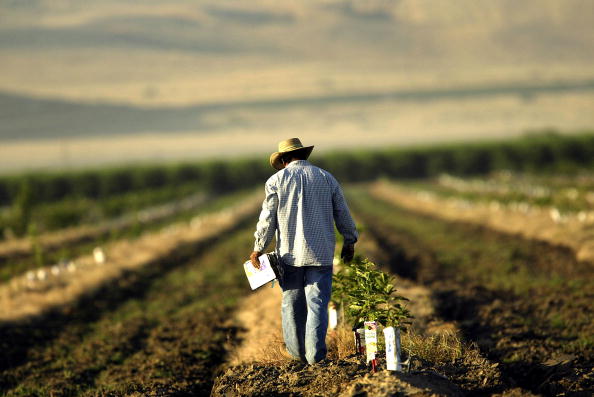A surprising amount of air pollution comes from farms

Air pollution is a well-known villain in the modern world. The dark smoke emanates from cars and factories, while big cities have been blamed for everything from climate change to the reduced visibility of the stars in the night sky.
But the scourge of urban smog isn't the only thing that contributes to air pollution. In fact, it might be time to point the finger of blame at a surprising culprit: farms.
Agricultural land in California alone contributes to between 25 and 41 percent of the nitrogen oxide in the air, a dismaying new study conducted by the University of California at Davis found. Nitrogen oxide is a blanket term for several compounds made of nitrogen and oxygen that contribute heavily to air pollution. While harmless in small quantities, large amounts of these gases can cause smog and even, in extreme circumstances, acid rain.
The Week
Escape your echo chamber. Get the facts behind the news, plus analysis from multiple perspectives.

Sign up for The Week's Free Newsletters
From our morning news briefing to a weekly Good News Newsletter, get the best of The Week delivered directly to your inbox.
From our morning news briefing to a weekly Good News Newsletter, get the best of The Week delivered directly to your inbox.
Writing in the journal Science Advances, researchers explained how large amounts of excess fertilizer, combined with the typical climate conditions of California, make for a stunning amount of pollution. While half of the nitrogen in fertilizer is used by the plants as nourishment, the other half sinks into the soil, where tiny bacteria convert the gas into nitrogen oxide. "Since you can't see it coming from the soils, it's very easy to miss," Ben Houlton, one of the scientists who led the study, told Newsweek.
Unfortunately, this problem doesn't have an easy solution: Farming remains a major industry in California, which grows about half of the fruits and nuts produced in the U.S. Read more about the study at Newsweek.
A free daily email with the biggest news stories of the day – and the best features from TheWeek.com
Shivani is the editorial assistant at TheWeek.com and has previously written for StreetEasy and Mic.com. A graduate of the physics and journalism departments at NYU, Shivani currently lives in Brooklyn and spends free time cooking, watching TV, and taking too many selfies.
-
 Iran cuts internet as protests escalate
Iran cuts internet as protests escalateSpeed Reada Government buildings across the country have been set on fire
-
 Tips and tricks for Veganuary
Tips and tricks for VeganuaryThe Week Recommends Here are some of our best recommendations for a plant-based start to the year
-
 FBI bars Minnesota from ICE killing investigation
FBI bars Minnesota from ICE killing investigationSpeed Read The FBI had initially agreed to work with local officials
-
 TikTok secures deal to remain in US
TikTok secures deal to remain in USSpeed Read ByteDance will form a US version of the popular video-sharing platform
-
 Unemployment rate ticks up amid fall job losses
Unemployment rate ticks up amid fall job lossesSpeed Read Data released by the Commerce Department indicates ‘one of the weakest American labor markets in years’
-
 US mints final penny after 232-year run
US mints final penny after 232-year runSpeed Read Production of the one-cent coin has ended
-
 Warner Bros. explores sale amid Paramount bids
Warner Bros. explores sale amid Paramount bidsSpeed Read The media giant, home to HBO and DC Studios, has received interest from multiple buying parties
-
 Gold tops $4K per ounce, signaling financial unease
Gold tops $4K per ounce, signaling financial uneaseSpeed Read Investors are worried about President Donald Trump’s trade war
-
 Electronic Arts to go private in record $55B deal
Electronic Arts to go private in record $55B dealspeed read The video game giant is behind ‘The Sims’ and ‘Madden NFL’
-
 New York court tosses Trump's $500M fraud fine
New York court tosses Trump's $500M fraud fineSpeed Read A divided appeals court threw out a hefty penalty against President Trump for fraudulently inflating his wealth
-
 Trump said to seek government stake in Intel
Trump said to seek government stake in IntelSpeed Read The president and Intel CEO Lip-Bu Tan reportedly discussed the proposal at a recent meeting